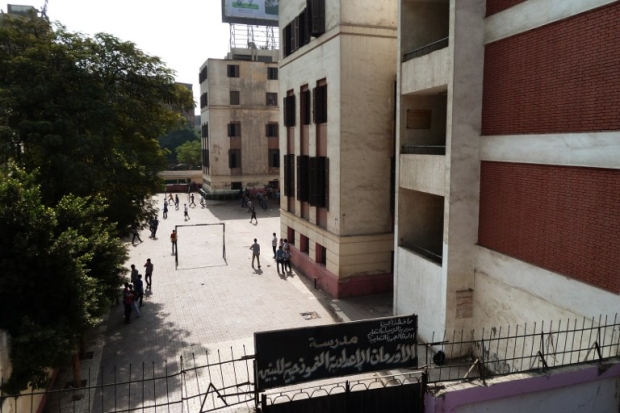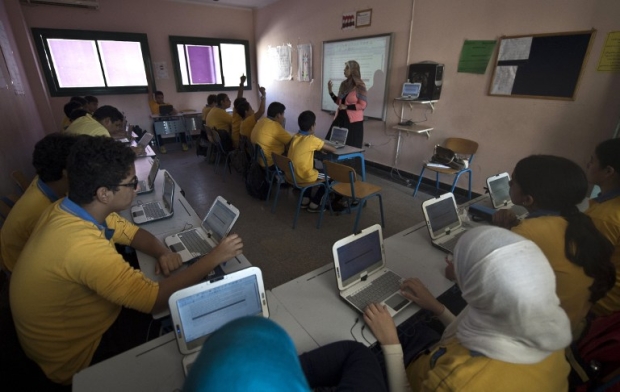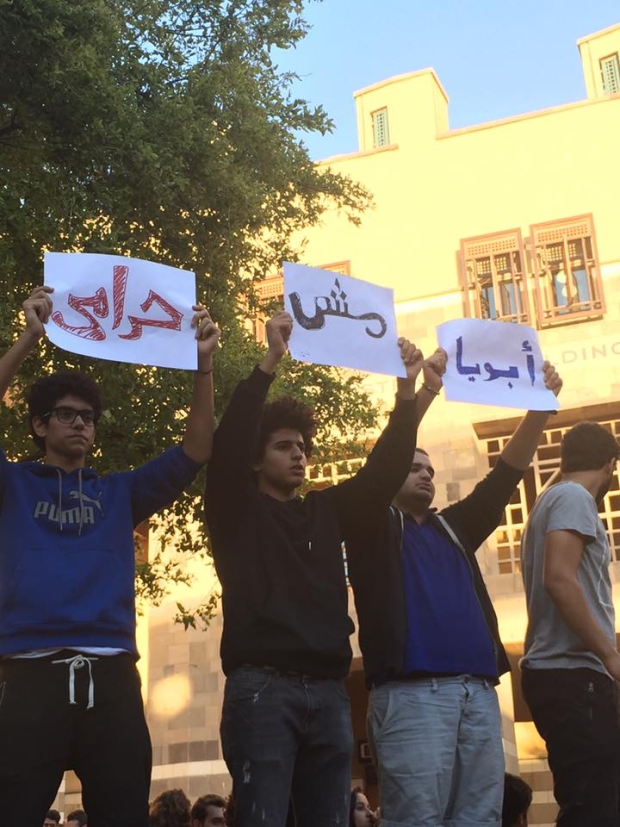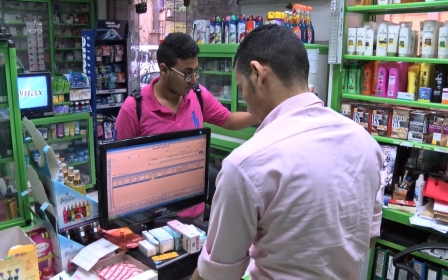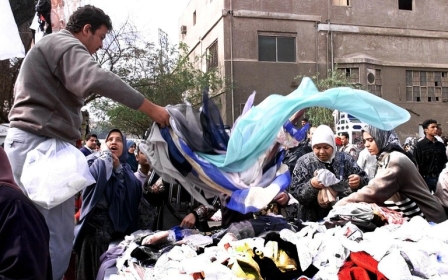Egyptian families: 'I would pay all I own to give my children a good education'
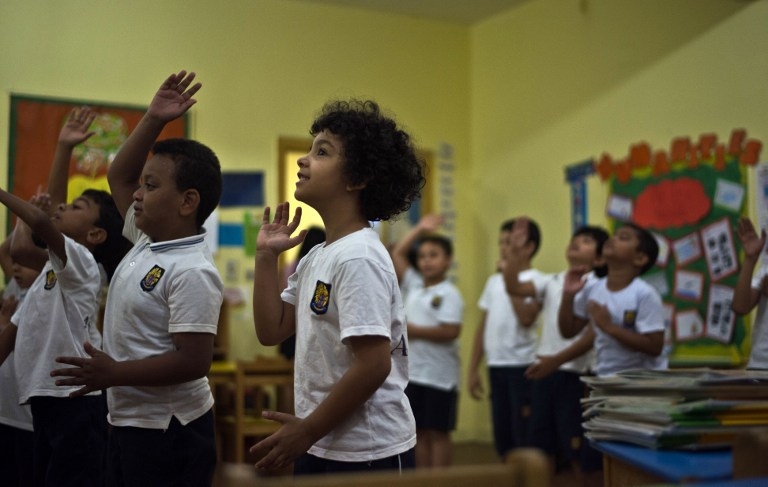
CAIRO - For weeks, Ahmed, a 50-year-old taxi driver, would watch his middle child Mohamed sleeping in his bed plagued by guilt. His guilt would turn to tears for not being able to afford the costs of his son's education.
Ahmed's guilt would turn to tears for not being able to afford the costs of his son's education
Ahmed had surgery following a car accident that forced him to work one shift instead of two in a taxi he does not own. As his monthly income dropped, he said he had to take one of his children out of school.
"It was a painful choice, his older brother is at the final year of high school and it would be unfair to let him drop out after he went that far, while the youngest daughter needs to get her primary education at least,” he said.
“Everyday I look at him and ask for his forgiveness, but I just could not afford to pay for his education. A 14-year-old teenager like him needs to get at least LE15 (less than 1$) daily to cover the costs of transportation and food at school, I could not afford that,” Ahmed added.
The family lives in the southern Cairo district of al-Mokattam, in an apartment complex called al-Zilzal. The impoverished area is where thousands who lost their homes during Egypt’s devastating 1992 earthquake were rehoused.
Free, but still costly
To save on daily pocket money costs, Ahmed’s eldest son only goes to public school for two days per week. The same goes for his youngest daughter, who did not get this year's school textbooks as they could not afford to cover the fees.
Education is free in Egypt’s public schools at all stages; students are only required to pay a few Egyptian pounds every year for textbooks. But with the quality of education deteriorating in the public school system, millions of Egyptian families have resorted to private tutoring for their children, adding another economic burden to already struggling households.
“Teachers do not teach students anything inside classrooms, and they force students to take private tutoring sessions to pass their classes,” Ahmed said.
The public school system in Egypt suffers from overcrowded classrooms, an outdated curriculum, scarce resources and it offers teachers very low wages, leaving them frustrated and unmotivated. Many teachers depend on private tutoring to make ends meet.
The public school system in Egypt suffers from overcrowded classrooms, an outdated curriculum and scarce resources
Luckily, Ahmed was connected to a local charity which paid for his children’s education, and he managed to get his son Mohamed back in school.
“I was like someone who was lost in the desert, and finally someone gave him a glass of fresh water.”
Haitham Mohamed, a volunteer at the charity that helps Ahmed, explained that his organisation started accepting donations to help finance education for students in a number of families a year ago. He added that they pay a monthly sum of LE4,000 ($220) to families for extra education costs, including books, transportation and pocket money.
“The new thing we are witnessing is an increase in the need of more Egyptians to finance the education of their children more than ever. As a result of the current economic crisis, we have seen new categories of Egyptians who need help,” Mohamed said. These categories include middle-class government employees and taxi drivers, he noted.
School dropouts
According to the state-owned al-Ahram newspaper, many Egyptians are not as fortunate as Ahmed. In January, al-Ahram quoted an unnamed education ministry official who said that 55.000 students had dropped out of schools in the last two years, and that there are joint efforts with the Social Solidarity Ministry to bring them back.
A UN report issued in 2014 indicated that the school dropout rate in primary education in Egypt is almost 3 percent, which is equal to 320,000 pupils not attending school.
“Poverty and child labour keep many children out of school, as do parental attitudes that see no value in education compared to work,” the report explained.
Such figures are not new, but recent economic turmoil following a decision to float the Egyptian pound in November 2016 has made the cost of education almost unbearable for millions of Egyptians. Egypt's inflation rate hit 24 percent following the decision.
Egypt ranked 139 out of 140 in the quality of primary education according to the Global Competitiveness Index for 2015-16.
Kamal Moghieth, a researcher at the National Centre for Educational Research and Development, explained that poverty has traditionally been an impediment for Egyptians to educate their children.
“This has led to two results, one of which is having a considerable part of the poor not sending their children to school in the first place, or others enrolling children at schools then dropping out,” he said.
Moghieth also referred to an increasing unemployment rate among university graduates. According to a 2014 study by the International Labor Organisation (ILO), youth unemployment among university graduates hit 34 percent, compared to an unemployment rate of 2.4 percent among youth who have no primary education degree.
“More Egyptians see no benefit in educating their children.”
Tuition fees: a universal burden
Even Egyptians who are well-off ranted about the rising tuition fees of international schools. In this video blog, Osman Badran, a parent of a student at the American International School (AIS), slammed the school’s increase in tuition.
"We are about to sell our honour, even our honour decreased by half after the flotation," he added.
'The new thing we are witnessing is an increase in the need of more Egyptians to finance the education of their children more than ever'
Asmaa is mother to a grade two pupil in a British international school. Before the flotation, she used to pay LE45,000 ($2,511) for tuition annually, but the costs jumped to LE65,000 ($3,621) after the 3 November decision.
“I had to leave the country altogether and move to London where I used to live. My child goes to the best schools here for free,” she told MEE.
Asmaa said she resisted the decision to move out of Egypt for a long time, but the sudden rise in the cost of living following the flotation made it impossible for her to continue living there.
“The situation in Egypt is very difficult, job opportunities are very rare and it is becoming impossible to continue living here.”
The country's wealthy are also suffering. Students at the American University in Cairo (AUC), Egypt’s top private university, protested in November 2016 against a harsh increase in tuition fees. Students are now required to pay half of their tuition in dollars. The students held signs saying "My father is not a thief" during the protests.
After mounting pressure from the students, the university decided to collect tuition fees according to the pre-flotation exchange rate which cost the university $1 million, as well as implementing a $5 million emergency grant scheme to make sure no students were forced to leave. According to a press statement by AUC administration, half of the university’s undergraduate students are currently enrolled in the grant system.
However, it is Egyptians on middle incomes who are hit hard by the current crisis. While they cannot afford to send their children to international schools, they also cannot send them to public schools because of the poor quality.
Eyad is an engineer and a parent to two children. One of them is enrolled at a kindergarten at a private school in Cairo. He pays LE15,000 ($835) per year for his son, and does not know what he will do when his younger child has to go to school in two years.
“I would pay at least LE30,000 ($1,682) annually for both in case the tuition stays the same. How much money [must] we earn to afford this?” he explained.
To save for his son’s tuition, Eyad explained that he has to enrol in Gameya, a saving scheme that Egyptians usually form to save up for education, marriage or any other financial necessities or emergencies.
“Others would sell their cars or apartments to save for their children's education. Some people may think that an apartment or a car are luxuries, but believe me these are not,” he added.
For Eyad and millions of Egyptians like him, quality education for their children is a form of investment. “I invest in my children, and I would pay all what I own to offer them a good education, that’s all what we have,” he said.
* Names have been changed for security reasons
This article is available in French on Middle East Eye French edition.
Middle East Eye propose une couverture et une analyse indépendantes et incomparables du Moyen-Orient, de l’Afrique du Nord et d’autres régions du monde. Pour en savoir plus sur la reprise de ce contenu et les frais qui s’appliquent, veuillez remplir ce formulaire [en anglais]. Pour en savoir plus sur MEE, cliquez ici [en anglais].


